Choosing the right CRM can feel overwhelming, but it's a critical step in organising customer data, streamlining sales processes, and driving growth. For Australian small businesses, from real estate agents and mortgage brokers to trades professionals, finding a system that fits your specific workflow without a hefty price tag is paramount. A disorganised sales pipeline leads to missed opportunities and wasted time, problems the right software is designed to solve.
If you're new to the concept, understanding the foundational customer relationship management (CRM) basics is a great starting point before diving into specific platforms. This guide is built to help you move beyond the basics and make an informed decision. We've analysed the best crm programs for small business available in Australia, cutting through the marketing jargon to offer a practical comparison.
Below, you will find a detailed breakdown of 12 top-tier CRM solutions. Each review covers key features, ideal use cases, pricing structures, and an honest look at their pros and cons. We've included screenshots for a visual preview and direct links to each platform, so you can easily explore the ones that best match your business needs. This resource is designed to simplify your research and help you select a CRM that will truly support your business.
1. Salesforce ANZ (Sales Cloud / Starter Suite)
Salesforce is a dominant force in the CRM world, and its ANZ-specific offering makes it one of the best CRM programs for small businesses in Australia and New Zealand. The platform's Starter Suite is designed as an all-in-one solution, bundling sales, service, and marketing tools to manage the entire customer lifecycle. This localised version provides AU-dollar pricing, includes local tax details, and offers support channels tailored to the region.
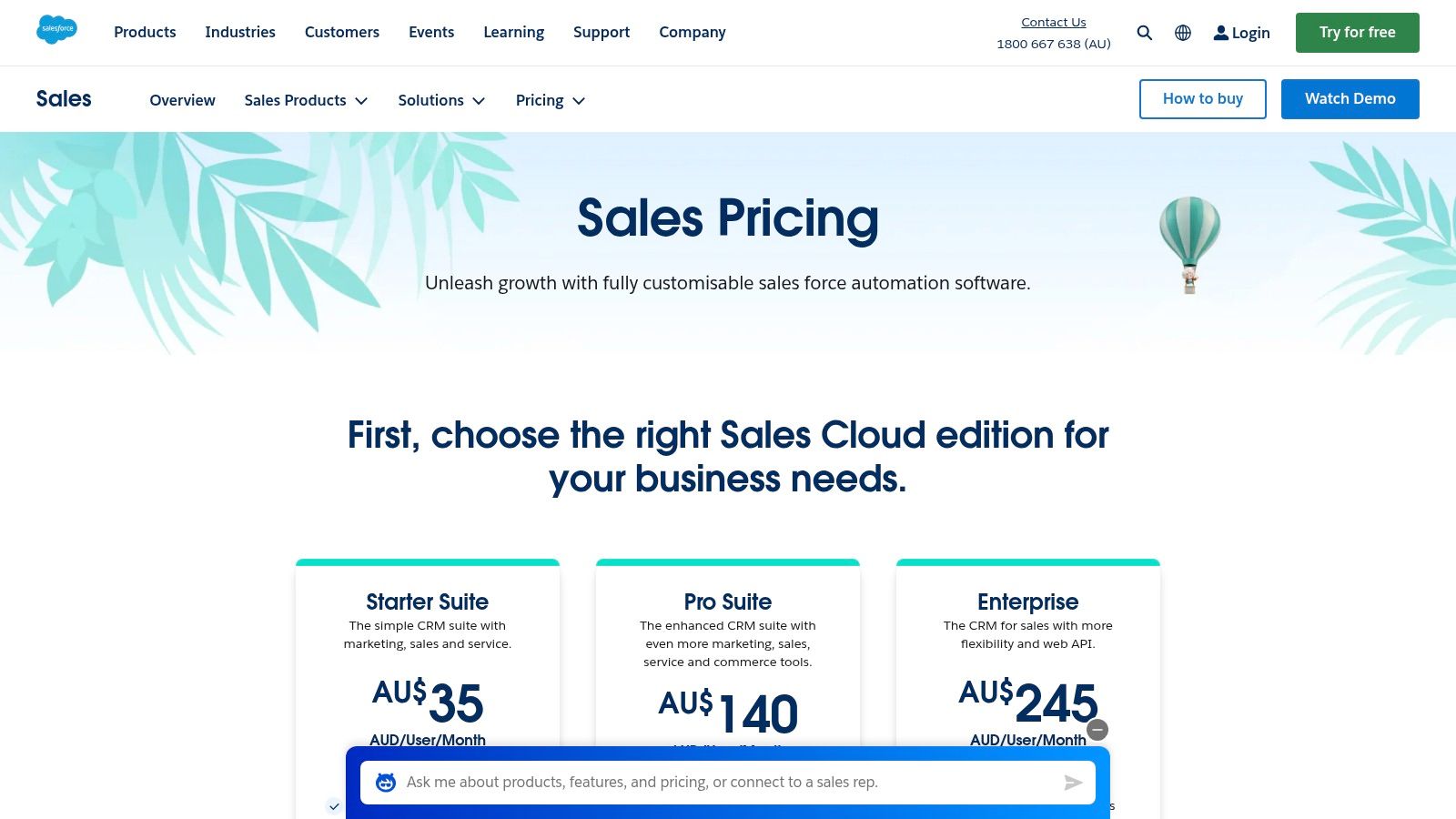
While Salesforce is known for its powerful features like pipeline management, sales forecasting, and customisable reporting, its true strength lies in its scalability. Businesses can start with the affordable Starter Suite and grow into more advanced editions without needing to migrate to a new system. For businesses utilising Salesforce, learning how to integrate Google Analytics with Salesforce can provide a holistic view of customer interactions from first touch to closed-won revenue.
The primary drawback is its complexity. New users often face a steeper learning curve compared to simpler CRMs. Costs can also increase significantly as you add more users or require specialised add-ons from the extensive AppExchange marketplace. However, for a small business with clear growth ambitions, it's a future-proof investment.
| Feature Highlights | Details |
|---|---|
| Pricing | Starts at AU$35 per user/month (billed annually) for the Starter Suite. |
| Best For | Ambitious SMBs needing a scalable, all-in-one CRM that can grow with them. |
| Pros | Powerful features, massive integration ecosystem, localised ANZ pricing. |
| Cons | Can become expensive, steeper learning curve than competitors. |
Website: https://www.salesforce.com/au/sales/pricing/
2. HubSpot (Free CRM and Starter Customer Platform)
HubSpot is renowned for its powerful free CRM, making it one of the best CRM programs for small businesses starting out or operating on a tight budget. The platform is designed around ease of use, providing a unified view of the customer journey across its Marketing, Sales, Service, and Content Hubs. Its free tools offer foundational features like contact management, deal tracking, and email marketing, which are often sufficient for new businesses. For Australian businesses, HubSpot also offers local data residency to help with compliance.
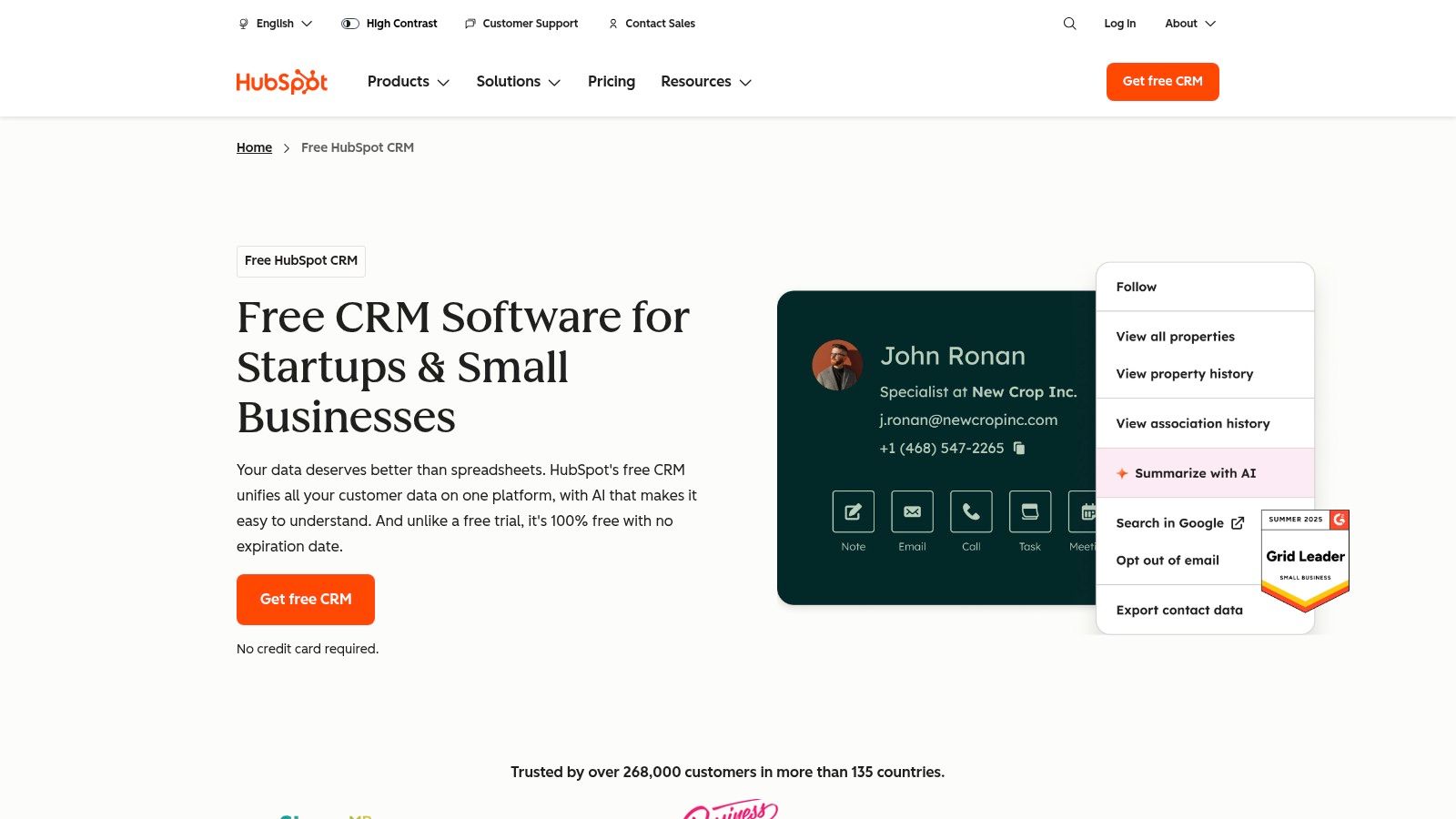
The platform’s key advantage is its incredibly smooth upgrade path. As a business grows, it can seamlessly transition to paid Starter tiers to unlock more advanced features, such as automation and embedded AI tools, without needing a complex data migration. This scalability, combined with a vast library of free templates and educational resources, lowers the barrier to entry for small businesses looking to organise their customer data and processes.
The main drawback is that costs can escalate quickly on higher tiers, especially when adding more paid users or contact lists. Advanced automation and in-depth reporting are locked behind the more expensive Professional and Enterprise plans. However, for most SMBs, the free version and affordable Starter Suite provide exceptional value and a solid foundation for growth.
| Feature Highlights | Details |
|---|---|
| Pricing | Free CRM available. Paid Starter Customer Platform plans start from AU$20 per month (billed annually). |
| Best For | Startups and SMBs wanting a user-friendly, free CRM with a clear and easy upgrade path. |
| Pros | Generous free tier, exceptionally easy to use, large library of resources, smooth upgrade path. |
| Cons | Advanced features are locked in higher-cost tiers, costs can rise with more contacts or paid seats. |
Website: https://www.hubspot.com/products/paas?utm_source=openai
3. Zoho CRM (Official)
Zoho CRM solidifies its position as one of the best CRM programs for small business by offering an unparalleled combination of power and value. Its platform is built around a vast, integrated ecosystem of business apps, allowing users to manage everything from lead and deal management to customer support and marketing campaigns from a single vendor. This integrated approach simplifies operations, ensuring data flows seamlessly between different business functions.
The platform’s key strength is its scalability, catering to businesses of all sizes with multiple pricing tiers, including a generous free-forever plan. Small businesses can start with the basics and progressively unlock more sophisticated features like workflow automation and multiple sales pipelines as they grow. This makes it an ideal choice for businesses looking for powerful small business automation tools without a hefty initial investment.
The main challenge with Zoho can be the initial setup. The sheer breadth of features and customisation options can feel complex for new users. Furthermore, some of the more advanced AI and analytics tools are reserved for the higher-priced tiers. However, for its price point, the feature set is exceptionally comprehensive, providing an excellent return on investment for businesses willing to navigate its options.
| Feature Highlights | Details |
|---|---|
| Pricing | Free plan available. Paid plans start from AU$20 per user/month (billed annually). |
| Best For | SMBs seeking a powerful, cost-effective CRM with a broad, integrated app ecosystem. |
| Pros | Very competitive per-user pricing, broad integrated app ecosystem, scales from simple to advanced needs. |
| Cons | Setup can feel complex due to the breadth of options, some AI/advanced features only on higher tiers. |
Website: https://www.zoho.com/crm/value-centric-crm.html?utm_source=openai
4. Pipedrive (Official)
Pipedrive has earned its reputation as one of the best CRM programs for small businesses by focusing intensely on the sales pipeline. Its core strength lies in its visual, drag-and-drop interface, which allows sales teams to track deals through every stage with exceptional clarity and ease. This sales-first approach simplifies the process, making it highly intuitive for users who need to manage leads and close deals without getting bogged down by overly complex features.
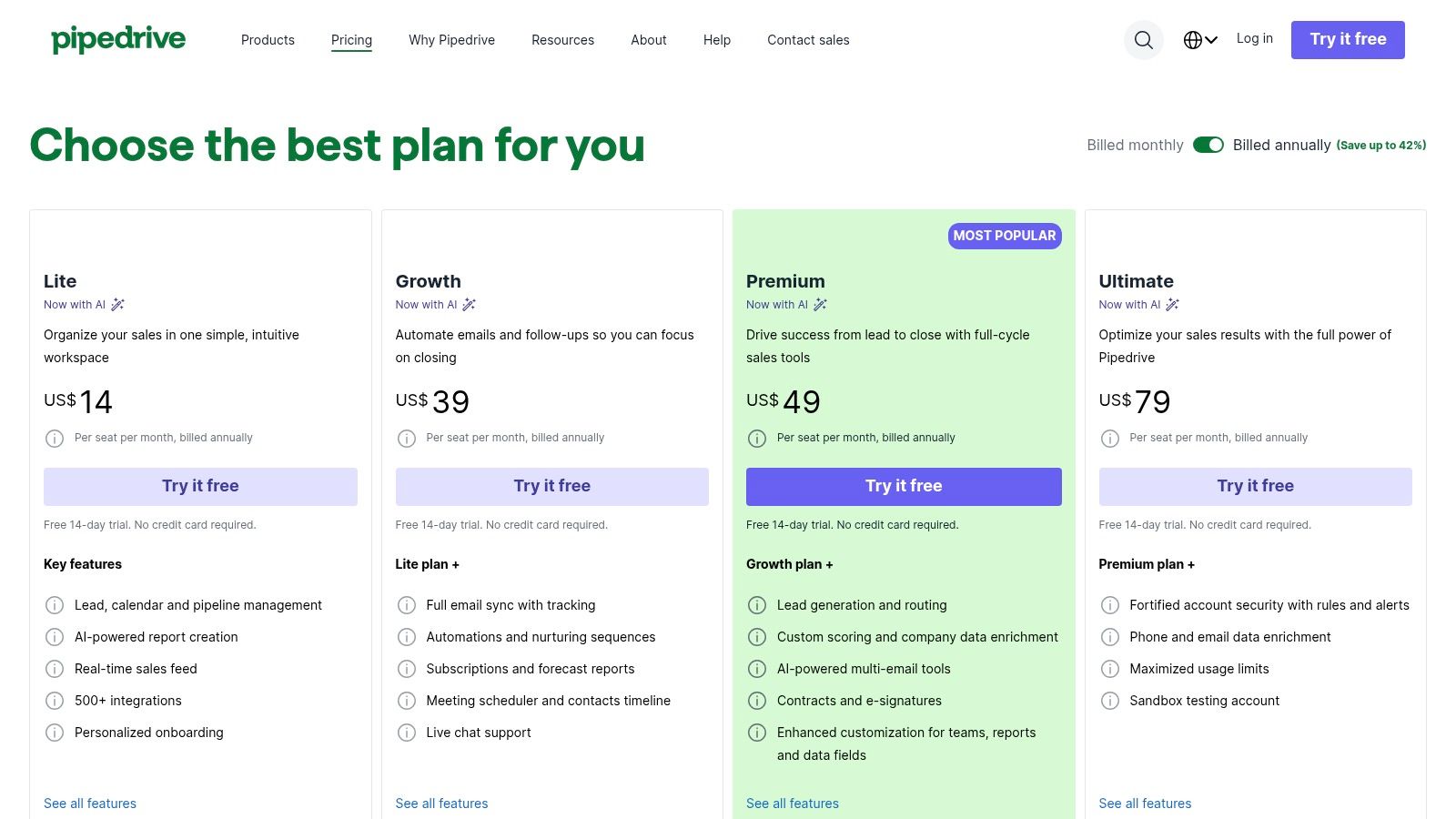
The platform includes built-in email synchronisation, activity scheduling, and powerful automations that trigger actions based on deal movements. While its core functionality is sales-centric, Pipedrive's marketplace offers over 500 integrations, allowing businesses to connect it with their favourite marketing, accounting, and support tools. For businesses evaluating this platform, understanding Pipedrive subscription costs is crucial for budgeting and planning, as more advanced features like AI-assisted reports are reserved for higher-tier plans.
The main drawback is that essential features for growing teams, such as advanced analytics and automation, are locked behind more expensive tiers. Additionally, relying on the marketplace for extended functionality can increase the total cost of ownership. However, for a small business that wants a CRM purely to drive sales and improve pipeline management, Pipedrive's simplicity and focus are hard to beat.
| Feature Highlights | Details |
|---|---|
| Pricing | Starts at US$14.90 per user/month (billed annually) for the Essential plan. |
| Best For | Sales-focused small businesses that prioritise an intuitive, visual pipeline. |
| Pros | Very easy to learn and use, focused sales pipeline execution, active marketplace for add-ons. |
| Cons | Advanced analytics/automation require mid/high tiers, add-ons can increase total cost. |
Website: https://www.pipedrive.com/en/pricing?utm_source=openai
5. Freshsales by Freshworks (Official)
Freshsales by Freshworks is a strong contender for small businesses looking for an intuitive CRM with powerful, built-in communication tools. Its key advantage is the seamless integration of phone, email, and chat directly within the platform, eliminating the need for multiple disparate applications. This makes it one of the best CRM programs for small business teams who need to track every customer interaction efficiently in one place.
The platform offers a generous free plan and low-cost entry points, making it highly accessible for startups and SMBs. Features like AI-powered lead scoring (Freddy AI), visual sales pipelines, and workflow automation are available even in affordable tiers, providing significant value. For businesses heavily reliant on voice communication, exploring advanced call management solutions can further enhance the capabilities offered by its built-in phone system.
The primary limitation is that comprehensive marketing automation requires upgrading to the Freshsales Suite or purchasing add-ons. Additionally, the most advanced customisation options are reserved for the higher-priced Enterprise plan, which may be a consideration for businesses with very specific workflow needs. However, for most SMBs, the standard offerings provide more than enough functionality.
| Feature Highlights | Details |
|---|---|
| Pricing | Free plan available for up to 3 users. Paid plans start from AU$25 per user/month (billed annually). |
| Best For | SMBs seeking an affordable, all-in-one sales CRM with integrated communication tools. |
| Pros | Generous free plan, built-in phone and chat, AI-powered insights, no mandatory seat minimums. |
| Cons | Deep marketing automation requires pricier plans, advanced customisation is limited to top tiers. |
Website: https://www.freshworks.com/crm/pricing/?utm_source=openai
6. monday sales CRM (Official)
monday.com transforms its popular project management platform into a powerful and highly visual sales CRM, making it one of the best CRM programs for small business teams that prioritise customisation and ease of use. It stands out with its colourful, board-based interface that allows users to visualise sales pipelines, track leads, and manage contacts with simple drag-and-drop functionality. This approach significantly lowers the barrier to entry for teams new to CRM software.
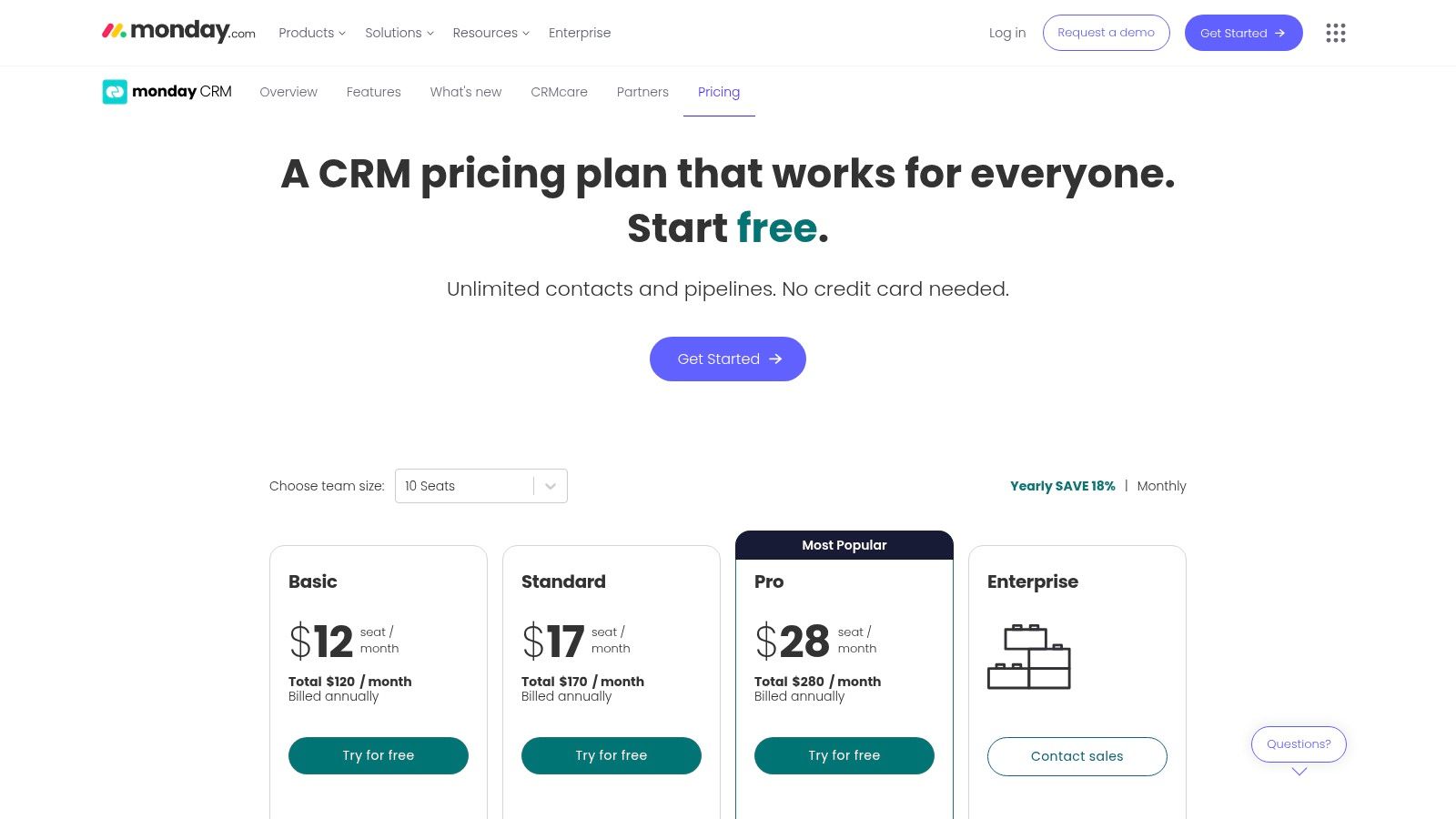
The platform’s strength lies in its flexibility. Without needing any code, you can customise pipelines, fields, and dashboards to perfectly match your sales process. Features like two-way email sync with Gmail and Outlook, along with robust automation and integration capabilities, help streamline repetitive tasks and keep all communication centralised. The extensive template library provides a great starting point for various industries, including real estate and trades.
The main drawback is the mandatory three-seat minimum on all paid plans, which makes it less cost-effective for solo entrepreneurs or businesses with only one or two sales reps. Additionally, some of the more advanced features, like lead scoring and sales forecasting, are reserved for the higher-tier Pro and Enterprise plans. However, for small teams wanting an intuitive and adaptable CRM, monday.com is a top-tier choice.
| Feature Highlights | Details |
|---|---|
| Pricing | Starts at AU$15 per seat/month (billed annually), with a required minimum of 3 seats. |
| Best For | Small teams that need a highly visual, customisable, and user-friendly CRM. |
| Pros | Extremely intuitive interface, flexible customisation without coding, great template library. |
| Cons | Three-seat minimum inflates the entry cost, key features are gated to higher plans. |
Website: https://monday.com/crm/pricing/?utm_source=openai
7. Insightly (Official)
Insightly stands out by seamlessly integrating CRM functionalities with robust project management tools. This makes it one of the best CRM programs for small businesses, especially those that deliver services or complex projects after the sale is complete. The platform allows teams to manage the entire customer journey, from lead capture and opportunity management to post-sale project delivery, all within a single, unified interface.
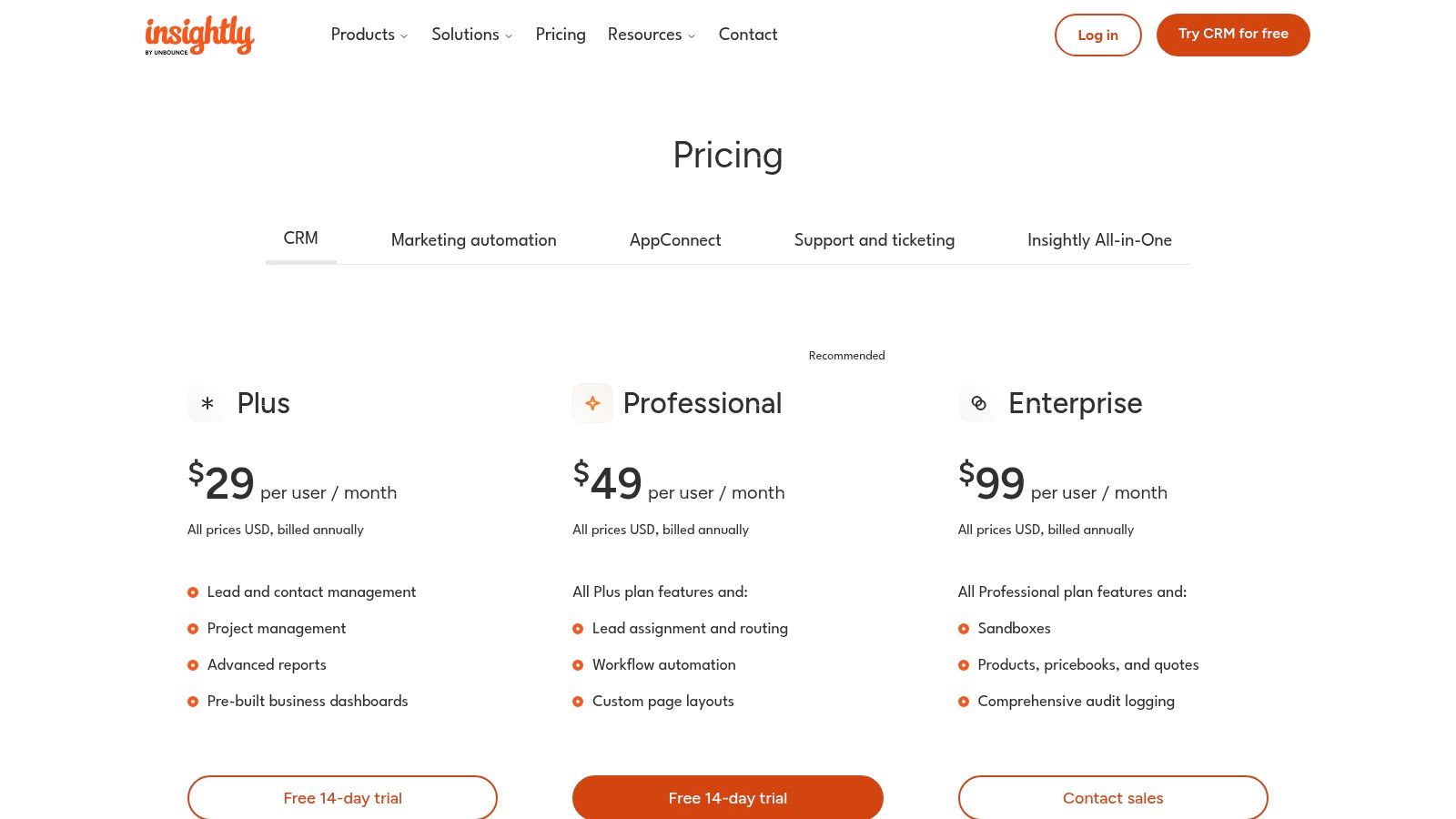
With a focus on an intuitive user experience, Insightly is relatively easy for new teams to adopt. Key features like workflow automation, customisable dashboards, and the AppConnect integration builder allow businesses to streamline processes without needing extensive technical knowledge. This combination of sales and project management helps eliminate data silos and improves collaboration between sales and delivery teams, providing a clearer view of the customer relationship from start to finish.
The primary drawback is the absence of a permanent free plan, which can be a barrier for brand-new startups. Furthermore, while the platform is user-friendly, accessing premium onboarding and dedicated support can incur additional costs. However, its clear pricing tiers and strong mid-tier value make it an excellent choice for businesses needing to manage both customer relationships and project execution efficiently.
| Feature Highlights | Details |
|---|---|
| Pricing | Starts at US$29 per user/month (billed annually) for the Plus plan. |
| Best For | Service-based SMBs, agencies, and consultancies needing combined sales and project management. |
| Pros | Combines sales and project delivery, intuitive interface, strong mid-tier value. |
| Cons | No permanent free CRM plan, premium support can add to the cost. |
Website: https://www.insightly.com/pricing-plans/?utm_source=openai
8. Keap (Official)
Keap positions itself as a comprehensive solution designed to centralise sales and marketing automation for small businesses. It goes beyond a typical CRM by integrating features like appointments, invoicing, and payments directly into the platform. This all-in-one approach is ideal for solo operators or lean teams looking to streamline their entire client management process, from lead capture to getting paid. For businesses in Australia and New Zealand, Keap's support for local payment gateways like eWAY is a significant advantage.
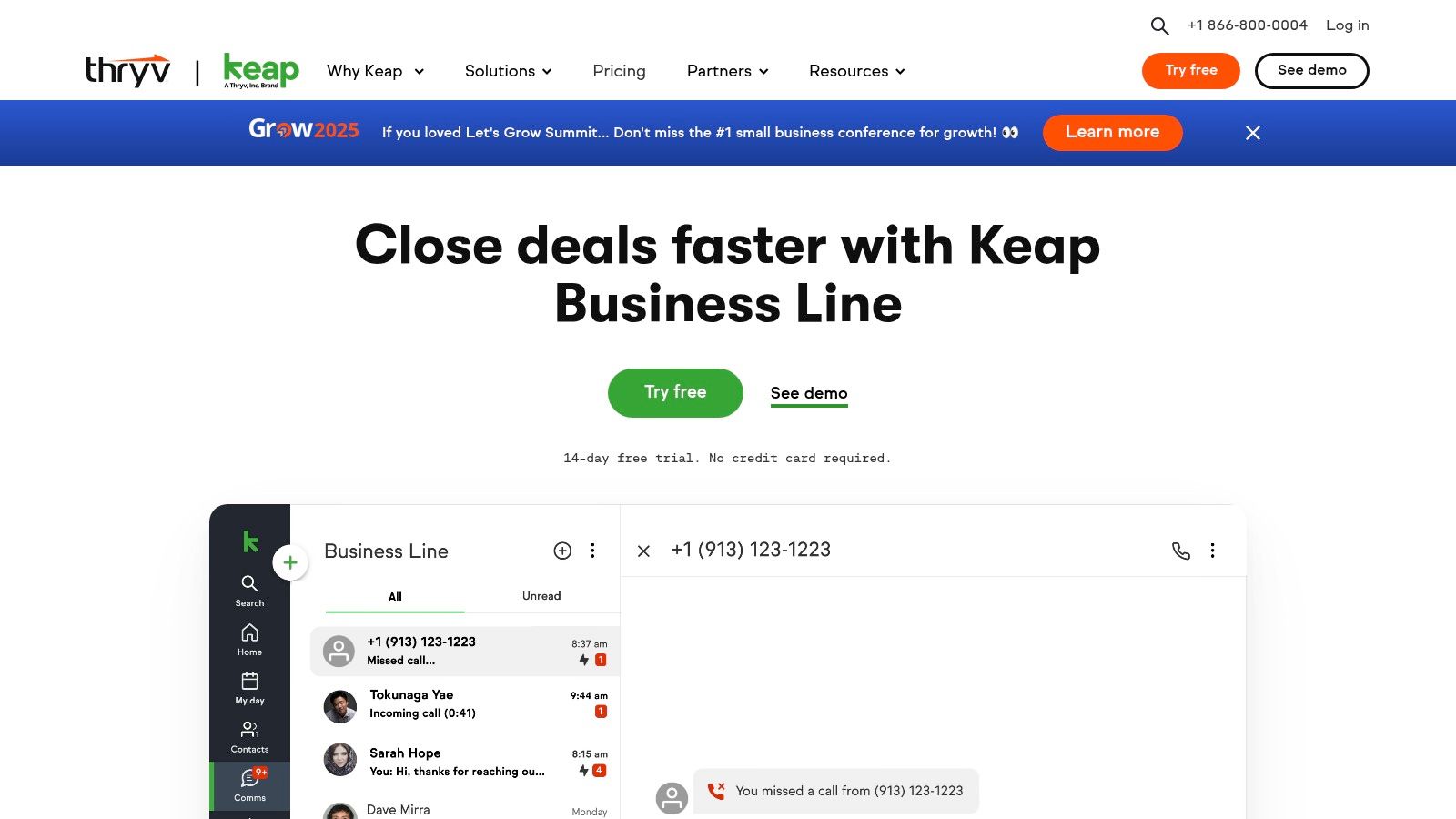
The platform's standout feature is its powerful visual automation builder, which allows users to create sophisticated marketing and sales sequences with a simple drag-and-drop interface. Keap also offers an optional business phone line, a unique feature among CRM programs that helps separate personal and professional communications. Tools like this can be invaluable in helping business owners reduce missed calls and capture every opportunity.
The main consideration for small businesses is the price point. Keap's starting cost is higher than many entry-level CRMs, reflecting its broader feature set. Additionally, advanced services such as data migration assistance may incur extra fees. However, for a business that needs a unified system for CRM and automation, Keap provides a robust, end-to-end toolkit.
| Feature Highlights | Details |
|---|---|
| Pricing | Plans start from US$159 per month (billed annually) for two users. |
| Best For | Service-based small businesses and solo founders needing strong marketing automation and payment tools in one platform. |
| Pros | Powerful visual automation builder, integrated invoicing and payments, local payment gateway support for AU/NZ. |
| Cons | Higher starting price than many competitors, some pro services cost extra. |
Website: https://keap.com/solutions/keap-business-line?utm_source=openai
9. Capsule CRM (Official)
Capsule CRM presents a refreshingly simple and user-friendly approach, making it one of the best CRM programs for small businesses that value ease of use over excessive features. It focuses on the core necessities of customer relationship management: organising contacts, tracking communications, and managing the sales pipeline. The clean interface allows for quick onboarding, ensuring teams can start benefitting from the system almost immediately without extensive training.
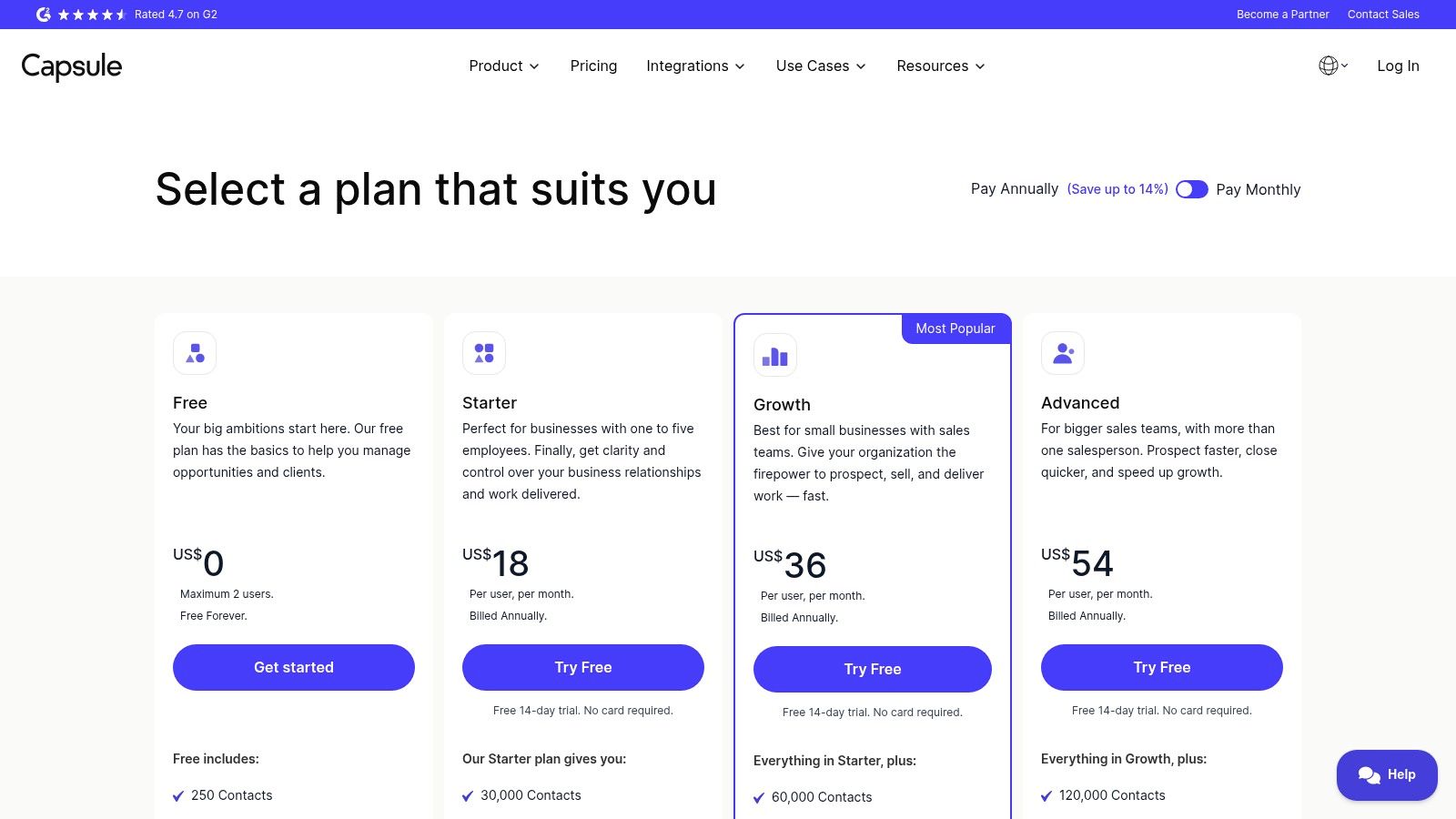
Its key differentiator is a deep, native integration with accounting software like Xero, which is invaluable for Australian small businesses needing to link sales activities directly to invoicing and financial data. While it lacks the built-in marketing automation of larger platforms, its straightforward design keeps the focus purely on sales and contact management. Higher-tier plans add valuable project boards and AI-assisted email writing to boost productivity.
The main limitation is that businesses requiring advanced automation or comprehensive, built-in marketing suites may find it too basic. However, for a small business or sole trader needing a no-fuss CRM that integrates seamlessly with their financial tools, Capsule CRM is an excellent, affordable choice.
| Feature Highlights | Details |
|---|---|
| Pricing | Free plan available. Paid plans start from US$18 per user/month. |
| Best For | Micro and small businesses seeking a simple, intuitive CRM with strong accounting integrations. |
| Pros | Simple, clean UI with fast onboarding, attractive pricing for SMBs, useful native integrations (e.g., Xero). |
| Cons | Fewer native marketing features than all‑in‑one suites, advanced reporting/automation in higher tiers. |
Website: https://capsulecrm.com/signup/?utm_source=openai
10. Microsoft Dynamics 365 Sales (Australia)
For small businesses already embedded in the Microsoft ecosystem, Dynamics 365 Sales presents a powerful, native CRM solution. Its Australian offering provides localised pricing and support, integrating seamlessly with Microsoft 365, Outlook, and Teams to create a unified workflow. This allows sales teams to manage customer relationships without ever leaving the applications they use daily, making it one of the most cohesive CRM programs for small business operations that rely on Microsoft products.
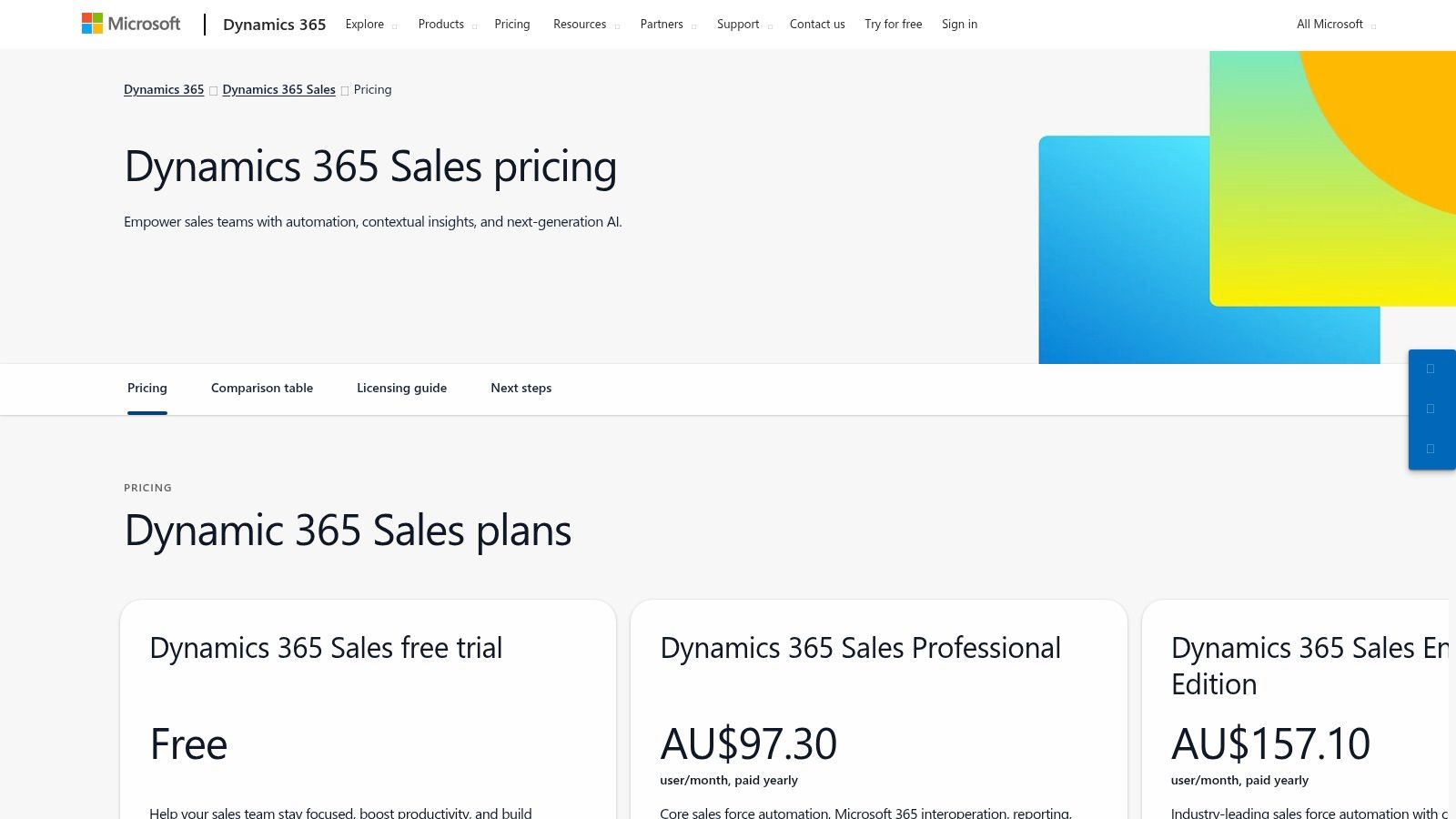
The platform's standout feature is the AI-powered Copilot, which assists with generating email responses, summarising meetings, and providing real-time insights during customer calls. This level of intelligent automation, combined with advanced sales forecasting and robust reporting through Power BI, offers a significant competitive advantage. It helps streamline tasks and provides data-driven guidance to improve sales performance.
However, its tight integration can also be a limitation for businesses not using the Microsoft suite. The platform is more expensive than many lightweight CRMs, and initial setup can be complex, sometimes requiring assistance from a Microsoft partner. Despite this, for a business leveraging Microsoft tools, Dynamics 365 offers unmatched synergy and sophisticated capabilities that justify the investment.
| Feature Highlights | Details |
|---|---|
| Pricing | Starts from AU$78.20 per user/month for the Sales Professional plan. |
| Best For | SMBs deeply integrated with the Microsoft 365 ecosystem. |
| Pros | Seamless integration with Microsoft apps, powerful AI Copilot features, robust security. |
| Cons | Higher price point, can be complex to configure without technical support. |
Website: https://www.microsoft.com/en-au/dynamics-365/products/sales/pricing?utm_source=openai
11. Zendesk Sell (Official)
Zendesk Sell is a sales-focused CRM designed to enhance productivity and make the sales process more efficient. It stands out for its user-friendly interface and strong integration with the broader Zendesk ecosystem, particularly its acclaimed Support Suite. This makes it one of the best CRM programs for small businesses that prioritise a unified view of customer sales and service interactions, allowing teams to see the full context of a customer relationship.
The platform provides straightforward pipeline management with features like lead scoring, automated sequences, and sales triggers to keep deals moving forward. While its entry-level plans cover the essentials, its true power in analytics and advanced automation is unlocked in the higher-tiered plans. This scalability allows a business to start with a simple sales pipeline and grow into a more sophisticated, data-driven sales organisation without changing platforms.
The main drawback is that some critical sales automation features are reserved for the more expensive tiers, which might be a limitation for small businesses on a tight budget. However, for companies already using Zendesk for customer support or those planning to, the seamless integration offers a powerful, consolidated customer experience management tool.
| Feature Highlights | Details |
|---|---|
| Pricing | Starts at AU$25 per user/month (billed annually) for the Sell Team plan. |
| Best For | Businesses that prioritise a unified sales and customer support platform. |
| Pros | Simple setup, strong analytics on higher tiers, excellent integration with Zendesk Support. |
| Cons | Key automation features are gated in higher-priced plans, can become costly. |
Website: https://www.zendesk.com/pricing/sales/?utm_source=openai
12. Xero App Store (CRM and Marketing category)
For small businesses already using Xero for accounting, its official App Store is an invaluable starting point for finding the best CRM programs. Rather than being a single CRM, it's a curated marketplace of third-party apps guaranteed to integrate with Xero's financial platform. This direct connection simplifies workflows by syncing customer data, invoices, and payment statuses between your sales and accounting systems, eliminating double entry and reducing errors.
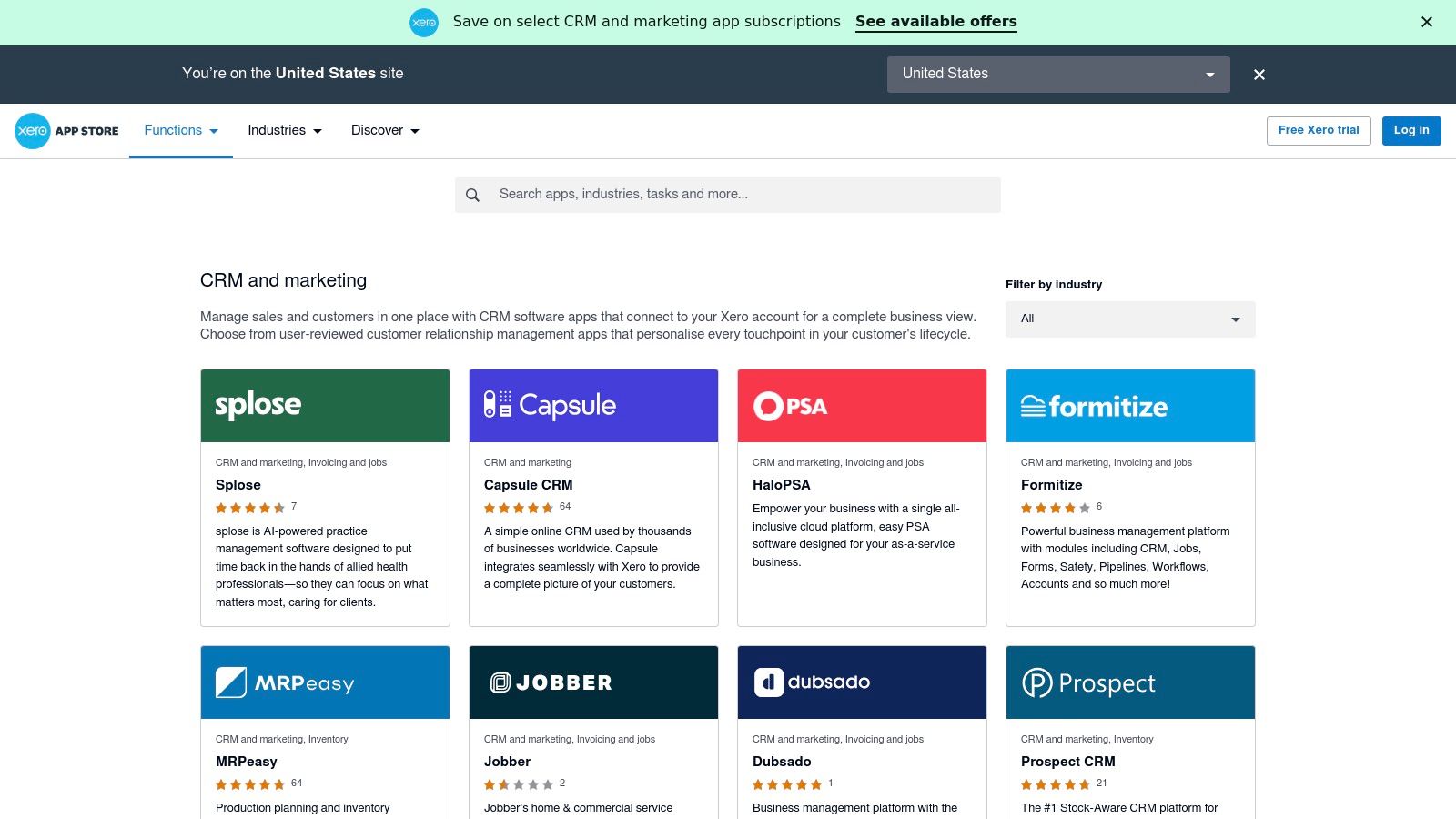
The App Store allows businesses to filter CRMs by industry and function, making it easier to find specialised solutions, such as stock-aware CRMs for wholesale or inventory-based businesses. Each listing includes user ratings and information on how long the app has been listed, providing helpful social proof. Featured apps include popular choices like Capsule CRM, Prospect CRM, and various HubSpot connectors.
The main downside is that you aren't purchasing a single product; the marketplace is a discovery tool. Pricing, features, and support are all handled by the individual CRM vendor, meaning quality and cost can vary significantly. Some apps may also be region-specific with limited reviews, requiring careful vetting before commitment.
| Feature Highlights | Details |
|---|---|
| Pricing | Varies by app; you purchase directly from the third-party CRM vendor. |
| Best For | Existing Xero users who want a CRM with guaranteed accounting integration. |
| Pros | Streamlines finding compatible CRMs, user ratings build trust, great for inventory-based businesses. |
| Cons | Not a CRM itself, pricing and quality vary widely between apps, some listings lack reviews. |
Website: https://apps.xero.com/function/crm?utm_source=openai
Top 12 Small Business CRM Features Comparison
| Product | Core Features | User Experience | Value Proposition | Target Audience | Price & Plans |
|---|---|---|---|---|---|
| Salesforce ANZ (Sales Cloud) | Pipeline, forecasting, reports, AppExchange | Scalable, steep learning curve | Deep features, local pricing/support | SMBs growing in ANZ | AU$ pricing, add-on costs apply |
| HubSpot (Free CRM & Starter) | Free CRM, marketing/sales/service hubs, AI | Generous free tier, easy upgrade | Unified platform, embedded AI | SMBs seeking easy start | Free + paid tiers, seat-based |
| Zoho CRM | Lead/deal management, workflows, integrations | Broad app ecosystem, complex setup | Competitive pricing, scalable | SMBs needing value & flexibility | Free + multiple paid tiers |
| Pipedrive | Drag-drop pipelines, 500+ integrations, AI | Very easy to use | Focused sales pipeline, easy learning | Small teams, sales-focused | Tiered pricing, add-on costs |
| Freshsales by Freshworks | Email, chat, phone, AI scoring, workflows | Free plan for 3 users, low entry | Robust features, no seat minimums | SMBs wanting multi-channel CRM | Free + paid plans |
| monday sales CRM | Visual boards, email integration, automations | Intuitive, quick setup | Customizable, broad templates | Small teams | Min 3 seats, Pro+ gated features |
| Insightly | Sales + project management, automation | Intuitive, tiered plans | Combines sales & projects | SMB & mid-market | Paid tiers, no free plan |
| Keap | Marketing automation, payments, phone line | Strong automation, local payments | All-in-one SMB toolkit | Solo founders, lean teams | Higher starting price |
| Capsule CRM | Contact/pipeline mgmt, project boards, AI | Simple UI, fast onboarding | Affordable, native Xero integration | Micro & small businesses | Affordable tiers |
| Microsoft Dynamics 365 Sales | MS365/Teams integration, AI Copilot, forecasting | Fits MS365 users, powerful | Advanced reporting, compliance | SMBs invested in MS stack | Pricier, multiple plans |
| Zendesk Sell | Lead scoring, sequences, integrations | Simple setup, strong analytics | Integrates with Zendesk Support Suite | Teams needing basic-to-advanced | Tiered pricing, cost rises at high |
| Xero App Store (CRM category) | Curated CRM listings with ratings | Helpful filters & industry focus | Saves time finding Xero-integrated CRM | AU/NZ businesses | Varies by app/vendor |
Making the Right Choice for Your Business's Growth
Navigating the landscape of CRM software can feel overwhelming, but making an informed decision is a foundational step toward sustainable growth. We've explored a diverse range of platforms, from comprehensive powerhouses like Salesforce and HubSpot to more specialised, user-friendly options like Pipedrive and Capsule CRM. The key takeaway is that there is no single "best" solution; the ideal choice is entirely dependent on your business's unique circumstances.
Your journey to selecting the right CRM begins with a clear understanding of your own processes. A real estate agent will have vastly different needs from a trades professional or a mortgage broker. Before you get swayed by a long list of features, take the time to map out your current sales pipeline, identify your primary communication channels, and pinpoint the biggest bottlenecks in your customer relationship management.
Key Factors to Guide Your Decision
When weighing your options, move beyond the feature list and pricing. Consider these critical factors that will influence your long-term success with the platform:
- Scalability: Will this CRM grow with you? Look for tiered plans and add-on capabilities. A platform like Zoho CRM offers a broad ecosystem, while HubSpot provides a clear upgrade path from its free tools to its powerful enterprise hubs.
- Integration Capabilities: Your CRM must work seamlessly with the tools you already use. Whether it's your accounting software like Xero, your email marketing platform, or industry-specific applications, check for native integrations or robust API support.
- Implementation and Onboarding: How much time and technical expertise is required to get started? Solutions like monday sales CRM are known for their intuitive setup, whereas a platform like Microsoft Dynamics 365 might require more specialised implementation support.
- User Adoption: The most powerful CRM is useless if your team won't use it. Prioritise a clean, intuitive interface and consider involving your team in the trial process to gauge usability and gather feedback.
Ultimately, choosing from the best crm programs for small business is a strategic investment in your future. Don't rush the process. Take advantage of free trials, watch demonstration videos, and read user reviews from businesses similar to yours. By aligning the CRM’s strengths with your specific operational needs and growth ambitions, you can transform it from a simple database into the central nervous system of your customer-centric business.
As you focus on managing customer relationships, ensure every phone call gets the attention it deserves. OnSilent – AI Call Assistant acts as your 24/7 AI receptionist, answering and qualifying calls so you never miss a lead, even when you're busy. Integrate it with your new CRM to automatically log call details and keep your client records effortlessly up-to-date.

